KARACHI: Legislators from the upper house of parliament on Tuesday stressed the removal of encroachments for the revival of Karachi Circular Railway (KCR) as one of them said that despite much media attention to the project nothing had emerged on the ground to launch the much-awaited public transport service.
During its two-day stay in the city to review railway projects and visit of KCR routes, the members of the Senate Committee on Railways were briefed on the so far developments on these projects. The committee members were mainly concerned about the removal of encroachments from the KCR routes and then resettlement and payment of compensation to the people affected by it.
‘We haven’t seen credible development on removal of encroachment and then settlement of people affected by it’
“We have seen that issues on the part of the federal government or the railways ministry have been resolved to some extent,” Senator Nasrin Jalil, member of the committee told Dawn after the visit. “But unfortunately there are several other issues which have to be addressed by the Sindh government and unfortunately nothing on ground has moved forward. We haven’t seen credible development on removal of encroachment and then settlement of the people affected by it. The recommendations of the committee would be forwarded to the authorities concerned for quick action in these areas.”
The KCR was commissioned in 1964, originally to help employees of Pakistan Railways to travel between their jobs — at and around the city and cantonment stations — and their residences in Karachi’s eastern neighbourhoods. The service became a full circle of 44-kilometres in 1970 and connected Karachi’s four main work areas: the port, the Sindh Industrial Trading Estate, the city’s central commercial areas such as Saddar and the Landhi Industrial Area.
The KCR remained the public transport of choice for the people of Karachi till 1984 when the number of its trains was cut down. Reasons for the move included lack of maintenance and repair, a yawning gap between rising expenditure due to higher fuel and operational costs and decreasing revenue due to subsidised tickets and the government’s inability to pour in money to improve tracks and stations.
According to the Karachi Mass Transit Cell, the number of level crossings — points where a railway line crosses a road or any other thoroughfare — also increased in the city, causing KCR trains to take longer to complete their journey. At one stage, there were 34 level crossings on the KCR route. The KCR finally shut down in 1999, forcing thousands of its daily users to travel by buses.
Published in Dawn, January 17th, 2018














































